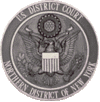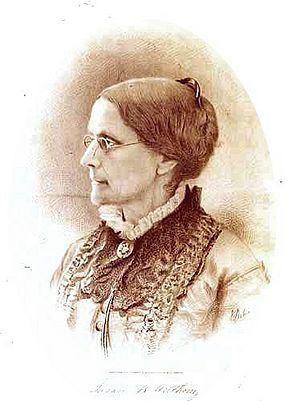Trial of Susan B. Anthony facts for kids
Quick facts for kids United States v. Susan B. Anthony |
|
|---|---|
 |
|
| Court | U.S. District Court for the Northern District of New York and the U.S. Circuit Court for the Northern District of New York |
| Full case name | United States v. Susan B. Anthony |
| Argued | June 17, 1873 |
| Holding | |
| Susan B. Anthony was found guilty of violating the Enforcement Act of 1870 and New York law by illegally voting, and fined $100. The right to a jury trial exists only when there is a disputed fact, not when there is an issue of law. | |
| Court membership | |
| Judge(s) sitting | Justice Ward Hunt |
| Laws applied | |
| Enforcement Act of 1870, U.S. Const. amend. XIV | |
|
Superseded by
|
|
| Sparf v. United States (1895) | |
United States v. Susan B. Anthony was an important court case in 1873. It involved Susan B. Anthony, a famous leader in the movement for women's right to vote. She was arrested for voting in Rochester, New York, during the 1872 elections. At that time, only men were allowed to vote by state law.
Susan B. Anthony argued that she had the right to vote. She pointed to the recently added Fourteenth Amendment to the U.S. Constitution. This amendment says that no state can take away the "privileges or immunities of citizens." She believed voting was one of these rights for all citizens, including women.
Susan B. Anthony's Fight to Vote
Why Susan B. Anthony Was on Trial
In 1872, Susan B. Anthony decided to vote in the presidential election. She believed that the Fourteenth Amendment gave her this right. However, New York state laws said only men could vote. Because she voted, she was arrested for breaking the law. Her trial was held in a U.S. federal court.
The Trial and the Judge's Decision
The judge in the case was Ward Hunt. He was a new Justice on the U.S. Supreme Court. He was also in charge of the federal circuit court where the trial took place. During the trial, Judge Hunt made a very unusual decision. He did not let the jury discuss the case. Instead, he told them they had to find Susan B. Anthony guilty. This is called a "directed verdict."
Susan B. Anthony's Powerful Speech
On the last day of the trial, Judge Hunt asked Susan B. Anthony if she wanted to say anything. She had not been allowed to speak before this. She then gave a very famous speech about women's right to vote. She spoke out against what she called a "high-handed outrage upon my citizen's rights." She also protested the unfairness of denying women the right to vote.
Judge Hunt ordered her to stop talking and sit down many times, but she kept speaking. After her speech, Judge Hunt told Anthony she had to pay a fine of $100. She bravely said she would never pay it. Judge Hunt then announced that she would not be jailed for not paying the fine. This decision stopped her from taking her case to the Supreme Court for an appeal.
Others Involved in the Voting Incident
Fourteen other women in Susan B. Anthony's neighborhood also voted in that election. They were arrested too, but the government never put them on trial. The people who worked at the election and allowed the women to vote were also arrested. They were found guilty. However, President Ulysses S. Grant later pardoned them. This happened after they were jailed for refusing to pay their fines.
Impact of the Susan B. Anthony Trial
Making Women's Suffrage a National Issue
The trial of Susan B. Anthony was closely watched by newspapers all over the country. This helped make women's right to vote a big topic across the nation. Before this, the women's rights movement focused on many different issues. After the trial, it started to focus mostly on getting women the right to vote.
Legal Discussions After the Trial
Judge Hunt's decision to tell the jury what to do caused a lot of debate among legal experts. This discussion lasted for many years. Later, in 1895, the Supreme Court made an important ruling. They said that a federal judge could not tell a jury to find someone guilty in a criminal trial. This meant that Judge Hunt's action in Anthony's trial was not allowed in the future.
A Symbolic Pardon in Modern Times
On August 18, 2020, President Donald Trump gave a symbolic pardon to Susan B. Anthony. This was done on the 100th anniversary of the 19th Amendment being approved. The 19th Amendment finally gave women the right to vote. The pardon was "symbolic" because Susan B. Anthony had passed away long ago. There was no one to officially accept it for her. Also, some groups that represent Susan B. Anthony's legacy, like the National Susan B. Anthony Museum and House, publicly said they did not accept the pardon.
 | Leon Lynch |
 | Milton P. Webster |
 | Ferdinand Smith |


